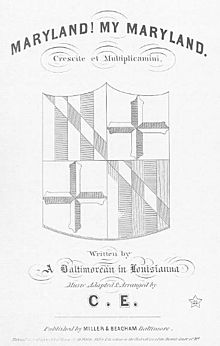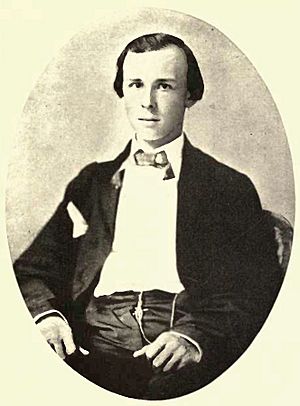Maryland, My Maryland facts for kids

The original sheet music of "Maryland, My Maryland"
|
|
| Regional anthem of | Maryland |
|---|---|
| Lyrics | James Ryder Randall, 1861 |
| Music | Melchior Franck, 1615 |
| Adopted | April 29, 1939 |
"Maryland, My Maryland" was the official state song of Maryland, a U.S. state. It was used from 1939 until 2021. The song uses the same tune as the famous Christmas carol "O Tannenbaum".
The words come from a nine-part poem written in 1861 by James Ryder Randall (1839–1908). The poem talks about Maryland's history and places. It also mentions important people from the state. The song encouraged Marylanders to fight against the U.S. government. During the Civil War, it became a popular battle hymn for the Confederate side.
The song's lyrics were written after the Baltimore riot of 1861. Because of this, the song calls President Abraham Lincoln names like "the tyrant" and "the Vandal." It also refers to the Union as "Northern scum." The song even includes the phrase "Sic semper tyrannis" (meaning "thus always to tyrants"). This was the same phrase shouted by John Wilkes Booth when he assassinated Lincoln.
For over 40 years, people tried more than ten times to change the state song. Finally, on March 22, 2021, lawmakers in Maryland voted to stop using "Maryland, My Maryland" as the state song. They did not choose a new song to replace it. On May 18, 2021, Governor Larry Hogan officially signed the bill.
History of the Song
The poem was written at the start of the American Civil War. At that time, President Abraham Lincoln ordered Union troops to go to Washington, D.C. to protect the capital. Many of these troops traveled through Baltimore, a major city in Maryland.
Many people in Maryland supported the Confederate side. Others did not want to fight against their Southern neighbors. The state's leaders wanted to stay out of the war. However, the movement of troops through Maryland caused problems.
One person reportedly hurt in these troop movements was Francis X. Ward. He was a friend of James Ryder Randall. Randall was a teacher in Louisiana at the time. When he heard about his friend's death, he wrote the poem "Maryland, My Maryland."
The poem asked his home state of Maryland to leave the Union and join the Confederacy. Randall later said he wrote the poem "almost without thinking" in the middle of the night on April 26, 1861. He felt a "powerful spirit" helped him write it very quickly.
The poem mentions the Revolutionary War and the Mexican-American War. It also talks about Maryland figures from those wars. The poem was first printed in a newspaper called the Sunday Delta in New Orleans.
Soon after, a woman from Baltimore named Jennie Cary put the poem to the tune of "Lauriger Horatius." The song quickly became popular in Maryland and throughout the South. It was sometimes called "the Marseillaise of the South." Confederate army bands played the song when they entered Maryland in 1862.
Some stories say that General Robert E. Lee told his troops to sing "Maryland, My Maryland" when they entered Frederick, Maryland. However, the people in Frederick were mostly loyal to the Union. So, Lee's troops did not get a warm welcome.
After the war, writer Oliver Wendell Holmes, Sr. compared "Maryland, My Maryland" to "John Brown's Body." These were two very popular songs from the opposing sides. He said each side had "a sword in its hand, each with a song in its mouth."
Why the Song Was Changed
In 2015, a lawmaker named Peter A. Hammen asked the Maryland State Archives to look at the song. They formed a group to review it. In December 2015, this group suggested that it was time to stop using the song.
The group offered ideas for changing the song's words or picking a completely new song. They said a Maryland state song should:
- Celebrate Maryland and its people.
- Be special to Maryland.
- Have historical meaning.
- Include all Marylanders.
- Be easy to remember, popular, and short (one or two parts long).
Bills to change the song's words were discussed in 2016. The Maryland Senate passed a bill. However, a similar bill in the Maryland House of Delegates did not get a vote. Some committee members had concerns after a meeting about the bill.
Lyrics
Here are the original lyrics of "Maryland, My Maryland." These words were written in 1861 during a difficult time in U.S. history. They show the strong feelings of the author, James Ryder Randall, about the events happening in his home state.
I
- The despot's heel is on thy shore,
- Maryland!:His torch is at thy temple door,
- Maryland!
- Avenge the patriotic gore
- That flecked the streets of Baltimore,
- And be the battle queen of yore,
- Maryland! My Maryland!
II
- Hark to an exiled son's appeal,
- Maryland!
- My mother State! to thee I kneel,
- Maryland!
- For life and death, for woe and weal,
- Thy peerless chivalry reveal,
- And gird thy beauteous limbs with steel,
- Maryland! My Maryland!
III
- Thou wilt not cower in the dust,
- Maryland!
- Thy beaming sword shall never rust,
- Maryland!
- Remember Carroll's sacred trust,
- Remember Howard's warlike thrust,-
- And all thy slumberers with the just,
- Maryland! My Maryland!
IV
- Come! 'tis the red dawn of the day,
- Maryland!
- Come with thy panoplied array,
- Maryland!
- With Ringgold's spirit for the fray,
- With Watson's blood at Monterey,
- With fearless Lowe and dashing May,
- Maryland! My Maryland!
V
- Come! for thy shield is bright and strong,
- Maryland!
- Come! for thy dalliance does thee wrong,
- Maryland!
- Come to thine own anointed throng,
- Stalking with Liberty along,
- And sing thy dauntless slogan song,
- Maryland! My Maryland!
VI
- Dear Mother! burst the tyrant's chain,
- Maryland!
- Virginia should not call in vain,
- Maryland!
- She meets her sisters on the plain-
- "Sic semper!" 'tis the proud refrain
- That baffles minions back amain,
- Maryland! My Maryland!
VII
- I see the blush upon thy cheek,
- Maryland!
- For thou wast ever bravely meek,
- Maryland!
- But lo! there surges forth a shriek,
- From hill to hill, from creek to creek-
- Potomac calls to Chesapeake,
- Maryland! My Maryland!
VIII
- Thou wilt not yield the Vandal toll,
- Maryland!
- Thou wilt not crook to his control,
- Maryland!
- Better the fire upon thee roll,
- Better the blade, the shot, the bowl,
- Than crucifixion of the soul,
- Maryland! My Maryland!
IX
- I hear the distant thunder-hum,
- Maryland!
- The Old Line's bugle, fife, and drum,
- Maryland!
- She is not dead, nor deaf, nor dumb-
- Huzza! she spurns the Northern scum!
- She breathes! she burns! she'll come! she'll come!
- Maryland! My Maryland!
- Even though the written words only have "Maryland" once in the second and fourth lines of each part, people usually sing "Maryland, my Maryland" twice to fit the music better.
Later Influence
Other songs like "Florida, My Florida", "Michigan, My Michigan", and "The Song of Iowa" use the same tune. All of these were written after "Maryland, My Maryland."
In 1962, author Edmund Wilson used the phrase "patriotic gore" from the song as the title for his book about Civil War literature.
The third verse of this song is sung every year at the Preakness Stakes horse race by the United States Naval Academy glee club.
In the movie Gone with the Wind, "Maryland, My Maryland" is played at the start of a Charity Ball scene. Some viewers thought it was a Christmas song because it uses the same tune as "O Tannenbaum."
See also
 In Spanish: Maryland, My Maryland para niños
In Spanish: Maryland, My Maryland para niños
 | Jackie Robinson |
 | Jack Johnson |
 | Althea Gibson |
 | Arthur Ashe |
 | Muhammad Ali |


